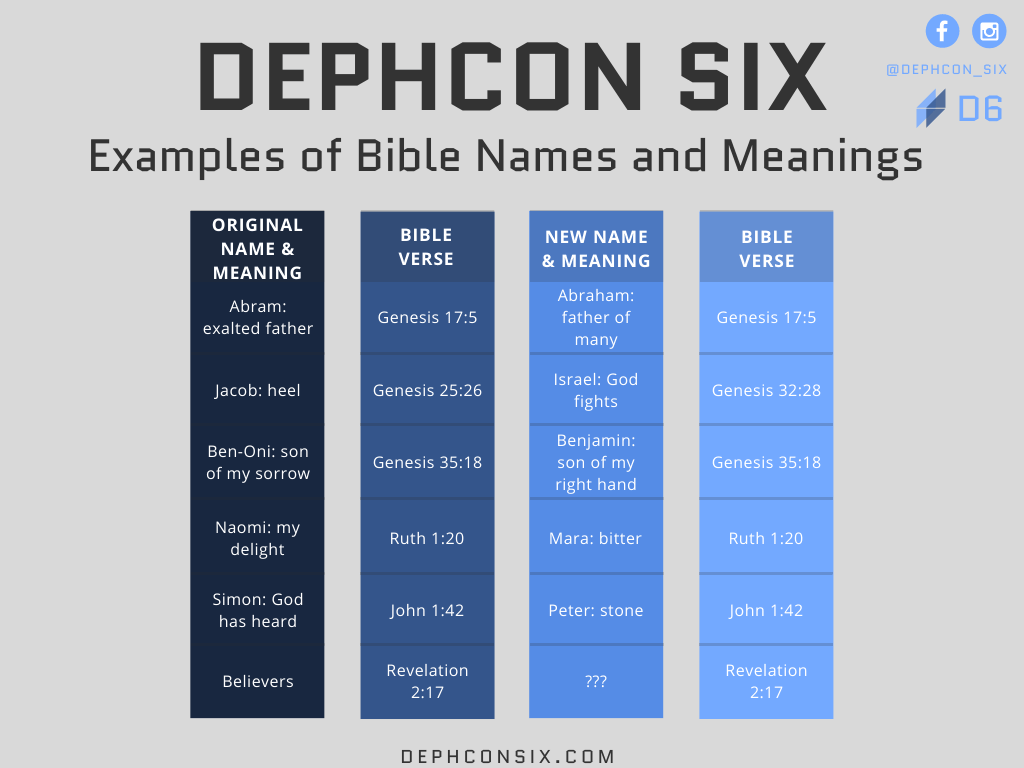What Was Your Name Again?
Bible names. Identity. What’s the connection and what does it have to do with you? Well, how does your name represent you? What’s the story behind your parents naming you? For that matter, what’s a Dephcon Six?
Meeting a stranger for the first time, it’s normal to ask their name. As their name is one of the first identifiers for a person’s identity. It’s inappropriate to call everyone “Guy” or “Hey You!”
Naming rights and rituals were an integral part of Bible names. For some, as you will see, their naming was effortless while others were difficult. Naming this website was difficult. I went through many names during brainstorming sessions.
When I finally felt led to go with Dephcon Six, there was a sense of excitement and trepidation. The joy stemmed from identifying a name that symbolizes this website’s purpose: a spiritual warfare guide and resource for the everyday Christian. The anxiousness I experienced emerged as the name for this site goes against popular website marketers’ naming formulas. But maybe that’s the point. Being led by the Lord is on a different plane of existence than being led by the world.
In the next blog post, we will explore the meaning of Dephcon Six and how it conveys this website’s identity. For now, let’s view various names in the Bible and how they communicate their identity.

Bible Names
The Holy Bible is rich in its description of how one’s name represents their identity. In particular, the Old Testament is teeming with names that ID a person, place, or thing. Some examples are:
- illustrating one’s character
- describing a grueling life experience
- changing a person’s name after an interaction with God
- naming a place or even a tree.
Jacob and Esau are two common examples. In Hebrew, Esau means “hairy”. We locate this description in Genesis 25:25. Esau’s twin brother Jacob’s name means “heel holder” or “supplanter” and this is described in Genesis 25:26. While there are scores of other books and chapters in the Old Testament that recount naming rituals, there may not be another chapter that does so six times as you are about to find out.
Genesis 35
There were six namings in Genesis 35. Each naming is significant for God’s people, from the naming of the altar to God to the naming of Benjamin:
- Genesis 35:7 Jacob named the altar to God, “El Bethel,” which means “God of Bethel”
- Genesis 35:8 Rebekah’s nurse, Deborah died and was buried under a tree named, “Allan Bachuth”, which means “oak/terebinth of weeping”
- Genesis 35:10 God changed Jacob’s name to Israel, which means “God fights”
- Genesis 35:15 Israel named the place where God spoke to him, “Bethel,” which means “house of God”
- Genesis 35:18 As Rachel lay dying from child labor, she named her son “Ben-Oni,” which means “son of weeping”
- Genesis 35:18 But Israel called him “Benjamin,” which means “son of my right hand”
The infographic below describes name changes found in the Old Testament and the New Testament:

The New Testament is no stranger to name changes. Jesus changed Simon’s name (God has heard) to Peter (stone or rock) in John 1:42. In the future, God will provide believers with a new name as revealed in Revelation 2:17.
Your Identity and Spiritual Warfare
The Bible names described above reveal the numerous ways one’s name can affect their identity. But just because your name is Rex, doesn’t mean you feel or act like a king. There’s more to you than the name your parents bestowed upon you.
For those who call on the name of Jesus Christ as their Lord and Savior, our identity transforms in front of God. He no longer sees us as sinners as described in Isaiah 43:25 and Colossians 2:13-14 but as His children as explained in Galatians 4:4-7 and Ephesians 1:13-14.
Our transition from a sinner, to a saint who sins, allows us access to the spiritual armor of God. As Ephesians 6:10-20 and 2 Corinthians 10:4 explain, our armor and weapons are not for physical warfare but spiritual. The reason for this is Ephesians 6:12:
For we do not wrestle against flesh and blood, but against principalities, against powers, against the rulers of the darkness of this age, against spiritual hosts of wickedness in the heavenly places.
Our battle isn’t in the physical against our fellow man, but spiritual against the evil forces that pervade our world.
What’s Next?
As the Bible reveals, there’s a portion of one’s identity within their name but when we call on Jesus as our Lord and Savior our identity transmutes into a child of God. This new identity allows us to battle the various attacks in our life.
So what is the identity and origin of the name, Dephcon Six? This will be discussed in the next blog post. But here’s a hint: spiritual warfare and the Bible-believing Christian combined with the US defense readiness condition.
Until then, check out this page for more information about Dephcon Six. Godspeed and God bless!
Related Posts
February 28, 2022
How to Overcome Temptation in Your Life
Temptations are all around, but how do you fight them? This article asks and answers four questions to overcome temptation.
October 24, 2021
Sin Matrix III Genesis 6 Fall of the Watchers
In the third article of the Sin Matrix series, the Fall of the Watchers article examines the demonic influence upon humanity and what to do about it.
September 24, 2021
Why Does God Test Us: 4 Life-Changing Reasons
I don’t like them and maybe you don’t either. Tests. In this article, we discuss 4 biblical reasons to answer the question, why does God test us?
September 7, 2021
Psyience of Psychedelics: A Trip for Your Mind
It’s time to embark upon a journey. This trip will not be physical, but spiritual, where the mode of transport is psychedelics. Prepare for takeoff.
August 7, 2021
Does God Test Us: 5 Biblical Examples
Does God test us? Are you going through a tough time and feeling like your world is falling apart? Fret not, for these trials might be from the Lord.
July 6, 2021
Death Cult II: The Immortality Hunt
Since the Fall of Man, the elites leave no stone unturned in their hunt for immortality, except one, the chief cornerstone, the only way to true immortality.
June 6, 2021
Information Manipulation: 5 Steps to Discern Truth
Information manipulation includes; disinformation, propaganda, and psychological operations. JIADS is 5 steps to discern the truth.
April 15, 2021
Sin Matrix II: Genesis 3 The Fall of Man
The Fall of Man was swift. With one bite, sin altered humanity with the death code mutating the DNA of God’s creation.
January 27, 2021
Pop Cult: The Secret Agenda of Manipulation
There is a subtle yet powerful force influencing you. The Pop Cult. The globalist elites’ propaganda and public relations firm executing their secret agenda.








